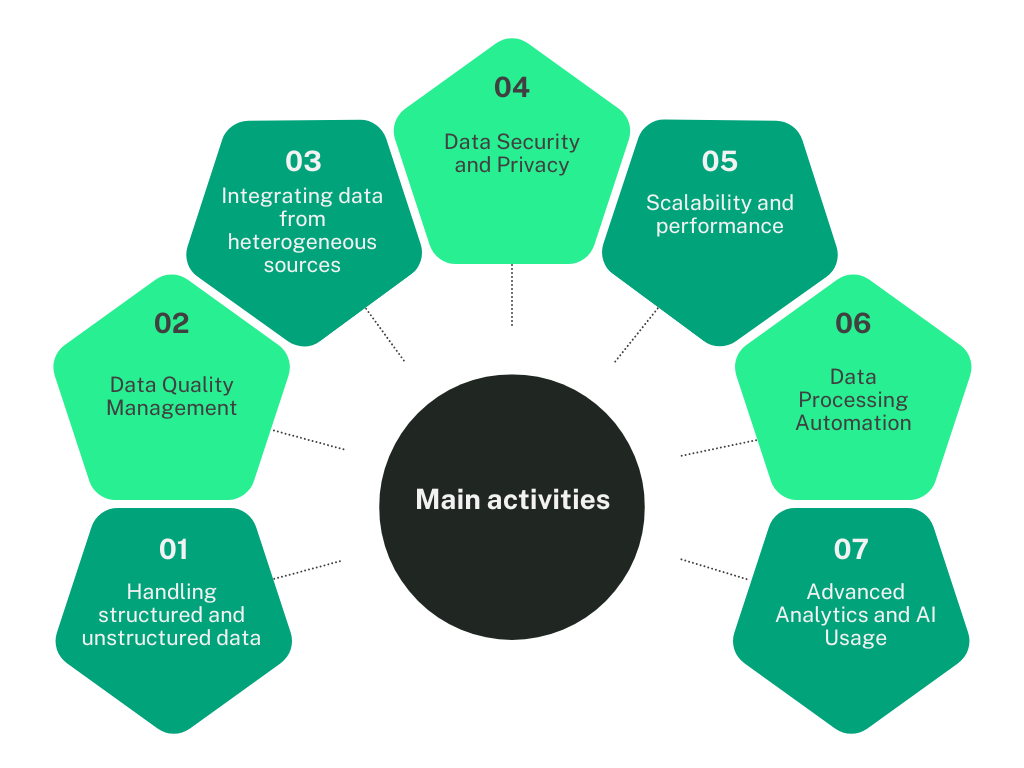Data Engineering: The Engine of Your Digital Transformation
.png)
Many organizations have started or will have to plan a digital transformation in order to take full advantage of technologies to improve their performance, competitiveness and customer experience. To determine whether the company is improving, it necessarily takes data to measure itself. Organizations have data from different systems (CRM, ERP, IoT sensors, social networks, etc.). In addition to the adoption of new technological tools, digital transformation therefore involves a cultural and organizational change that allows the company to develop a data culture and optimize the management and use of its data.
Many of these organizations want to implement artificial intelligence (AI) into their processes. As mentioned by the Intelligence and Data Institute (IID) at Université Laval , “Without data, it’s impossible to do AI. That’s often where the problem lies: when data is available, it’s not necessarily well organized or structured.”
In the organization, it is data engineering that will implement the tools and technical solutions necessary for the storage, integration and transformation of data to produce relevant information to support the organization in its decisions.
This article is an introduction to the different activities performed by data engineering.
Operational vs. Informational Needs
Data engineering must meet operational and informational needs.
For operational needs, among other things, it will be necessary to produce reports to support users in their daily activities and this may require access to data in real time or at high frequency.
For informational needs, an integration of historical data and various sources will allow the creation of information counters containing measures and indicators and thus be able to follow and understand the evolution of the company's business processes.
With a good understanding of our business processes, we set the stage for machine learning and artificial intelligence in general.
Main activities of data engineering

Whether for operational or informational needs, data engineering will have to carry out the following activities:
Handling structured and unstructured data : A structured data source is one in which the structure is defined and known, such as databases or CSV files. Unstructured text files, images, and videos are unstructured data and require specific tools and methods to process and analyze them.
Data Quality Management: As mentioned organizations collect data from various sources but sometimes this data is incomplete, inaccurate or poorly structured. One of the crucial tasks of data engineering is to ensure that the data used for analysis and decision making is reliable and of high quality.
Integrating data from heterogeneous sources: Integrating all these sources in a coherent and efficient manner is a major challenge. Data engineering must enable seamless integration between various technologies and different data formats. This includes data cleansing, validation and transformation processes.
Data Security and Privacy : Data security management is paramount to prevent sensitive data leaks, privacy breaches, and cyberattacks. Organizations must not only comply with government regulations, but also ensure data security throughout its lifecycle, from storage to analysis.
Scalability and performance : Organizations must be able to manage large amounts of data and process complex queries, sometimes in near real-time, while ensuring optimal performance. Data engineering must enable the expansion of data management infrastructures and systems.
Data Processing Automation: Automating data acquisition, transformation, and loading (ETL) processes has become a key challenge. Automated flows are needed to reduce reliance on manual processes, improve efficiency, and ensure data is continuously updated. Optimizing data flows is also essential to facilitate the application of artificial intelligence and machine learning.
Advanced Analytics and AI Usage: AI models need clean, well-structured data to perform advanced predictions and analytics. Data engineering is therefore essential to create reliable training environments.
Conclusion
Data engineering is a field of Data Governance and is constantly evolving with major challenges related to the management of data volumes, their quality, their security, and their strategic use. Organizations that successfully overcome these challenges will be better positioned to leverage the richness of their data and to remain competitive in an increasingly data-driven world.
AI tools may have supported the creation of this content